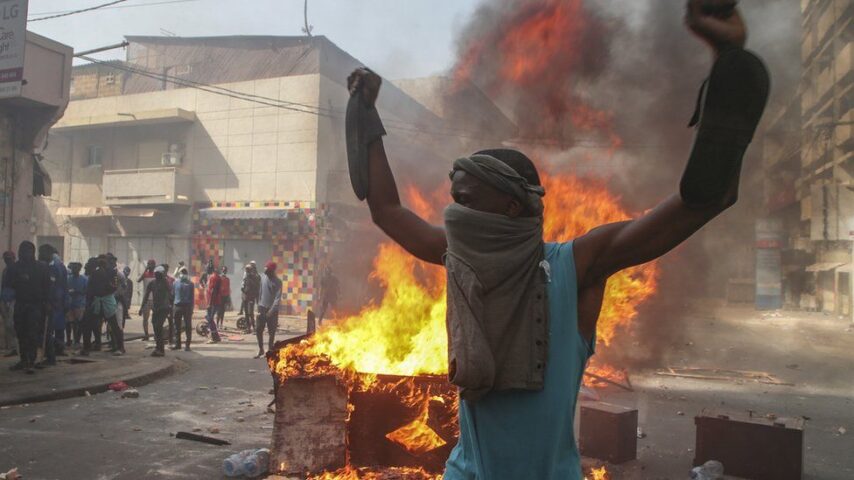The United States condemns the unrest in Senegal

BY ABDOULAYE SIDIBÉ
(With the contribution of Anselme Mensah in Bamako)
A statement attributed today, Saturday, to Matthew Miller, in the Office of the U.S. State Department spokesperson, says that the United States condemns the violent unrest that erupted Thursday in Senegal, having so far claimed 15 lives in a country known to be peaceful. Protesters and the police clashed today for the third consecutive day over the sentencing of the country’s main opposition leader, Ousmane Sonko, a verdict viewed as politically motivated by many Senegalese who see it as a move on the part of Senegalese president, Macky Sall, to prevent Sonko from running for president next year when the second and last legal term of Macky Sall—who is suspected of planning to run for an illegal third term—expires.
The statement from the Office of the State Department spokesperson reads:
“As a strong friend and partner to Senegal, the United States is troubled and saddened by the violence and damage we have witnessed in many parts of the country. We offer our deep condolences to the families and friends of those who have died, and we wish a fast and full recovery to those injured. Senegal’s strong record of democratic governance, rule of law, and peaceful coexistence is something for which the Senegalese people can be rightfully proud. We urge all parties to voice their views in a peaceful manner.”
The violence appeared to have abated after Sonko’s surprise release this afternoon, causing an eruption of joy, while anti-government shouts continued in the streets of Dakar, Senegal’s capital.
Sonko, 48, a seasoned politician (mayor of one of the country’s largest cities, a parliamentarian) who has announced his intention to run for the 2024 presidential election, was accused of raping a twenty-year-old woman in 2021 and making death threats against her. The brilliant graduate of Senegal’s fine School of Administration and former chief tax inspector who was fired because of his vehement criticism of President Macky Sall, denied the allegations and was, indeed, cleared of the rape charge. However, the court convicted him and sentenced him to two years in prison for “debauching” a person under the age of 21, on the basis of an offence described in the country’s penal code as “immoral behavior.” Unlike the United States where a convicted Donald Trump can run for president, the law here requires that all presidential candidates have a clean legal record, hence the interpretation of the sentence as a barrier erected by Macky Sall’s government, which denied the allegation.
![Opposition leader Ousmane Sonko waves to his supporters during a meeting in Ziguinchor on May 24, 2023 [Muhamadou BittayeAFP]](https://myafricanmagazine.com/wp-content/uploads/2023/06/Opposition-leader-Ousmane-Sonko-waves-to-his-supporters-during-a-meeting-in-Ziguinchor-on-May-24-2023-Muhamadou-BittayeAFP-765x510.webp)
This is clearly the largest unrest Senegal has experienced in probably decades. But the suspicion of President Sall’s intention to run for an illegal third term is nothing new. Members of the civil society and other Senegalese elite, who fear the potential breach of the constitution, have been warning against that. Barthélémy Dias, mayor of the capital and fierce opponent of President Macky Sall, is among the most vocal voices against Macky Sall’s potential run in 2024.
The U.S. government’s call for restraint came among similar calls from the United Nations, the African Union, and human rights organizations, including Amnesty International.
Typically, in addition to crushing the protests, the authorities have restricted access to social media platforms—Facebook, WhatsApp and Twitter—in theory, to stop “the dissemination of hateful and subversive messages.”
In a statement released yesterday titled Senegal: The authorities must immediately halt the police violence and restore social media,Amnesty International’s regional director for West and Central Africa, Samira Daoud, says, “We condemn the restrictions on access to social media by the Senegalese authorities in the face of violent protests,” adding “These restrictions on the right to freedom of expression and information constitute arbitrary measures contrary to international law, and cannot be justified by security reasons.”
Echoing the same concerns, the NGO Reporters Without Borders said, “Sociopolitical violence must not be used as a pretext to restrict the right to inform,” thereby calling on the government to fully restore Internet access.
It’s no secret that democracy has been in free fall in parts of sub-Saharan Africa over the past decade or so. Senegal is no exception in a West African region where heads of state have succeeded their fathers who, before them, had monopolized power for decades; while others, using their ill-gotten fortune to buy the support of a few politicians, feel empowered to imprison political adversaries or chase them into exile.
Macky Sall was elected president in April 2012 by his fellow countrymen who fought hard—with the loss of lives in the process—to prevent then-President Abdoulaye Wade from serving a third illegal term. The Senegalese people prove more determined than most others in this desert of democracy to fight for their rights.

